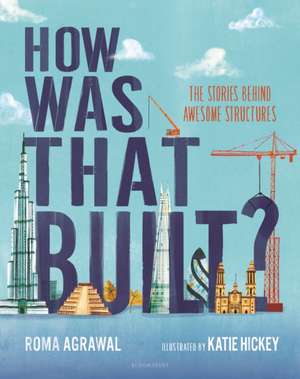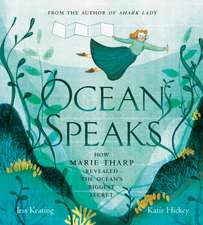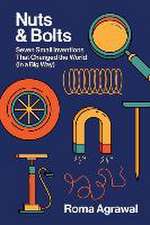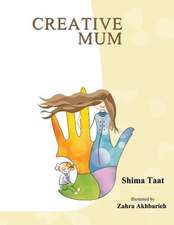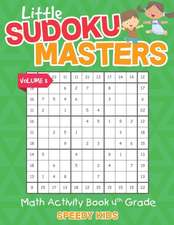How Was That Built?
Autor Roma Agrawal Ilustrat de Katie Hickeyen Limba Engleză Hardback – 16 aug 2022 – vârsta până la 11 ani
From skyscrapers that reach astonishing heights to bridges that span deep and wide rivers, the world is filled with awe-inspiring structures. But how do they work?
Meet the extraordinary people who challenged our beliefs about what's possible, pioneering remarkable inventions that helped build the Brooklyn Bridge in the US, the Pantheon in Italy, the Burj Khalifa in Dubai, the Shard in England and the Sapporo Dome in Japan. Discover the ingenious methods engineers have come up with to enable us to build underground, underwater, on ice, and even in space.
With text written by award-winning structural engineer Roma Agrawal and detailed full-color illustrations by Katie Hickey, this book provides unique and illuminating perspectives of the world's most incredible constructions. How Was That Built? is a perfect gift for curious kids who want to learn more about construction, architecture, science, technology, and the way things work.
This children's picture book also serves as a fascinating companion to the author's adult nonfiction book Built: The Hidden Stories Behind our Structures, winner of the AAAS/Subaru SB&F Prize for Excellence in Science Books.
| Toate formatele și edițiile | Preț | Express |
|---|---|---|
| Hardback (2) | 81.97 lei 3-5 săpt. | |
| Bloomsbury Publishing – 15 sep 2021 | 81.97 lei 3-5 săpt. | |
| Bloomsbury USA – 16 aug 2022 | 147.80 lei 3-5 săpt. |
Preț: 147.80 lei
Nou
28.28€ • 29.61$ • 23.40£
Carte disponibilă
Livrare economică 15-29 martie
Specificații
ISBN-10: 154760929X
Pagini: 80
Dimensiuni: 249 x 312 x 20 mm
Greutate: 0.75 kg
Editura: Bloomsbury USA
Notă biografică
Caracteristici
Recenzii
From the construction of the Brooklyn Bridge to building on the moon, this utterly fascinating and visually stunning book is sure to build sky-scraping curiosity in young engineers. Favourite parts - intricate cross sections of the world's most ingenious structures scattered with mind boggling facts about feats of human ingenuity. And, I had always wondered how it is possible to build foundations underwater - now I know!
I adored reading How Was That Built? with my son. The fascinating facts and huge detailed pictures led to lots of interesting conversations for both of us. You will never take buildings for granted again!
Exploring this beautiful book feels like having a conversation with Roma, full of expert insight and fascinating detail. With playful illustrations, stacks of brand-new information and plenty of context - this is children's non-fiction at its best.
How Was That Built? is a brilliant and essential book . Hopefully schools and libraries will purchase the book in big numbers because it deserves to be widely read and discussed. I also think it will do a lot to encourage young people to consider a career in construction.
Open this book at any page and you are immediately sucked into the fascination of how things work - a wonderful achievement and a beautiful one too.
Distinguished engineer Roma Agrawal has written an excellent introduction to engineering for young people. Her clear and concise descriptions of the challenges engineers have had to overcome to achieve some of the greatest wonders of our modern civilization will make the reader all the more appreciative of what has been achieved through human imagination and determination. Dramatic illustrations by the artist Katie Hickey nicely complement the engineer's words throughout.
Based on inspiring stories of engineers from around the world and across the ages, this book has you nodding and smiling from ear to ear as the science of the built world around us is clearly explained and beautifully illustrated. Without question, some of the world's most talented future engineers will have been inspired by this book.
How Was That Built? shows us how visionary engineers throughout history have built some of the most dazzling structures on the planet. Roma Agrawal's expert knowledge of structural engineering shines through and Katie Hickey's fantastic illustrations make each page turn interesting and engaging. From the 2000-year-old Pantheon, to the dizzying heights of the Burj Khalifa, there is something for all ages.
A fantastic detailed compendium of engineering feats brought to life by Hickey's stunning illustrations. A must for curious minds of any age!
Praise for Roma's adult title Built: A fascinating celebration of the impact that structural engineering has on all our lives . [an] eye-opening book
Not only did it explain how things are built but it also gave little activities you can do at home as well
Full of fun facts about amazing buildings, this book is as amazing as all the buildings inside it
The language is technical, Roma never patronises her young readers, but explanations are given relating complex engineering principles to scenarios which are easily understood
Descriere
'From the construction of the Brooklyn Bridge to building on the moon, this utterly fascinating and visually stunning book is sure to build sky-scraping curiosity in young engineers' Kate Pankhurst, author of the Fantastically Great Women series
'I adored reading How Was That Built? with my son. The fascinating facts and huge detailed pictures led to lots of interesting conversations for both of us. You will never take buildings for granted again!' David Walliams, comedian and children's author
As seen on Steph's Packed Lunch and featured in Cerys Matthew's BBC Radio 6 Music show and 'The Dreams We Live Inside' on BBC Radio 4
Join Roma Agrawal, the award-winning structural engineer who worked on The Shard, for an exciting behind-the-scenes look at some of the world's most amazing landmarks.
Meet the extraordinary people who challenged our beliefs about what's possible, pioneering remarkable inventions that helped build the Brooklyn Bridge in the US, the Pantheon in Italy, the Burj Khalifa in Dubai, the Shard in England and the Sapporo Dome in Japan. Discover the ingenious methods engineers have come up with to enable us to build underground, underwater, on ice and even in space. And learn about the impact different forces and materials can have on a structure by carrying out your own engineering experiments from the 'Try it at Home' sections.
Beautiful and detailed illustrations by Katie Hickey, including cross-sections, skylines and close-ups of engineering techniques in action, provide unique and illuminating perspectives of our most awe-inspiring constructions.
Get ready to see the built world around you like never before!
'Exploring this beautiful book feels like having a conversation with Roma, full of expert insight and fascinating detail. With playful illustrations, stacks of brand-new information and plenty of context - this is children's non-fiction at its best' Isabel Thomas, science writer and author of Moth and Fox
'Skilfully illustrated and filled with remarkable details, this book is a treat for any young engineer. Roma's breadth of knowledge and genuine passion shines through every page. It's simply beautiful' Angela Saini, science journalist and author
'Open this book at any page and you are immediately sucked into the fascination of how things work - a wonderful achievement and a beautiful one too' Mark Miodownik, materials engineer, broadcaster and author of Stuff Matters
'How Was That Built? is a brilliant and essential book . Hopefully schools and libraries will purchase the book in big numbers because it deserves to be widely read and discussed. I also think it will do a lot to encourage young people to consider a career in construction' Infrastructure-Intelligence.com
